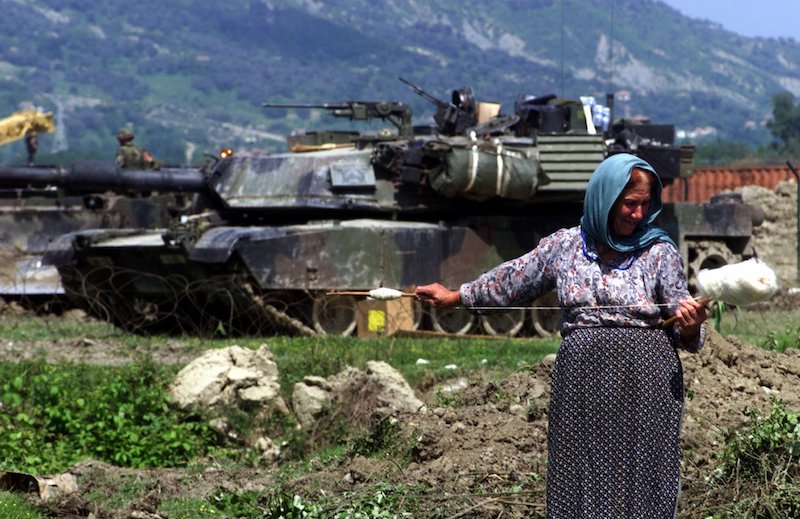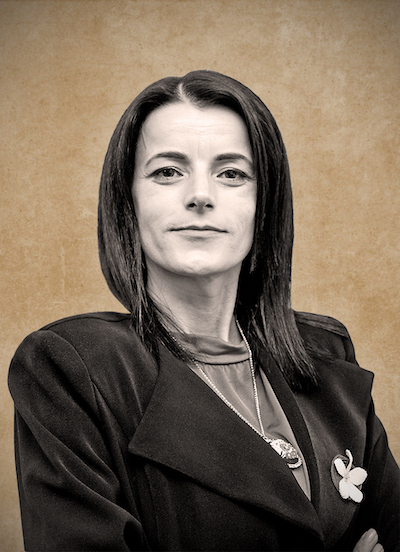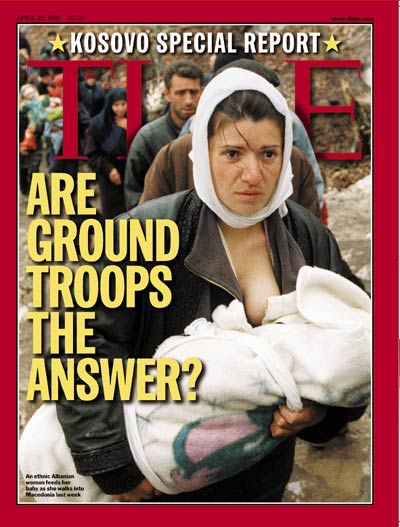Hol Dir den wöchentlichen SPARTANAT-Newsletter.
Dein Bonus: das gratis E-Book von SPARTANAT.

Gewalt gegen Frauen im Krieg – Vasfije Krasniqi Goodman im Kosovo 1999
Im Krieg wird der Missbrauch von Frauen häufig als „Kriegswaffe“ eingesetzt. Ziel der Täter ist es, die Frauen zu Opfern zu machen und auch die Gesellschaft zu schänden, aus der sie kommen. Dieses Martyrium musste auch die damals 16-jährige Vasfije Krasniqi Goodman miterleben, die während des Kosovo-Krieges 1999 von zwei Serben – darunter ein Polizist – nacheinander brutal vergewaltigt wurde. „Ich habe den Polizisten immer wieder angefleht, mich zu töten“, sagt sie, doch ihr Peiniger wollte sie leiden sehen. Sven Lilienström, Gründer der Initiative Gesichter des Friedens, sprach mit Vasfije Krasniqi Goodman über den Tag, der alles veränderte.
Frau Krasniqi Goodman, wir möchten Sie gerne zu allererst fragen: Was bedeutet „Frieden“ für Sie ganz persönlich?

Ich bin davon überzeugt, dass „Frieden“ stark von zwei Faktoren beeinflusst wird – den inneren und äußeren Faktoren. Während die äußeren Faktoren oftmals mehr wahrgenommen werden, beginnt der Prozess der Friedensbildung meiner Meinung nach mit den inneren Faktoren. Wirklicher Frieden muss aus innerem Frieden hervorgehen. Global gesehen ein hehrer Wunsch, der zumindest derzeit weit entfernt scheint.
Sie wurden während des Kosovo-Krieges 1999 von zwei Serben vergewaltigt – darunter auch ein Polizist. Was können Sie uns über den 14. April 1999 erzählen? Wie hat sich Ihr Leben in den Tagen und Wochen danach verändert?
Für mich – und sicherlich für viele andere Frauen – war der Tag, an dem es passierte der „Tag der Apokalypse“. Der Tag, der sich wie der letzte meines Lebens anfühlte. Als 16-jähriges Mädchen hatte ich furchtbare Angst. Dass ich nicht wusste, was um mich herum geschah, machte es noch schlimmer. Manchmal schauten wir BBC oder CNN und sahen die schrecklichen Berichte über Massaker, die von serbischen Streitkräften verübt wurden, oder über Morde an Säuglingen. Aber über Vergewaltigungsfälle hatte ich bis dahin kaum etwas gehört. Ich erinnere mich noch genau daran, wie mich der Polizist mit Gewalt packte und mir mit seiner Schusswaffe drohte. Er schleppte mich in sein Auto und vergewaltigte mich dort. Ich fühlte mich hilflos und völlig ausgeliefert. Anschließend brachte er mich in ein Dorf, in dem sich eine große Gruppe von Menschen versammelt hatte. Ich weinte unaufhörlich, aber sie lachten mich nur aus und drohten mir. Kurz darauf brachte mich ein älterer Mann in ein nahegelegenes Haus und vergewaltigte mich dort ein weiteres Mal. Er sah zwar aus wie ein Zivilist, trug aber eine Schusswaffe. Meine Familie und ich hatten bereits zuvor viel durchgemacht – die Vergewaltigungen haben meine bestehenden emotionalen und physischen Wunden somit wieder neu aufreißen lassen. Dieser Tag war die Hölle – es fühlte sich an, als hätte mein Leben an Bedeutung verloren. Ich habe lange Zeit nur gelebt, weil ich es musste!
Die Verbrecher laufen noch immer frei herum, während ich nach Gerechtigkeit suche.
Vor zwei Jahren sagten Sie in einem TV-Interview: „Ich habe den Polizisten immer wieder angefleht, mich zu töten. Doch er sagte, ich würde mehr leiden, wenn er mich am Leben lässt“. Warum wollten Sie damals lieber sterben?
Das stimmt. Schon vor den Vergewaltigungen dachte ich, dass mich meine Peiniger töten werden – sie taten das mit vielen ihrer Opfer. Ich war die ganze Zeit über wie gelähmt und wusste, dass schlimme Dinge passieren werden. Mein Flehen, getötet zu werden, war die beste Option, die ich mir damals vorstellen konnte. Diese Option war besser als all die Dinge und Gefühle, die ich erlebte. Ich wollte nur, dass es endet. All die widerlichen Dinge, die sie mir antaten, haben mein Wesen völlig verändert – meine Seele gebrochen. Meine Jungfräulichkeit wurde mir von einem Verbrecher genommen; ich wollte einfach nicht in einer Realität leben, in der das alles passiert ist. Aber sie hatten sich entschieden, mich nicht zu töten, wohlwissend, dass ich mehr leiden würde, wenn ich weiterlebe. Und sie hatten recht!

Weltweit sind Mädchen und Frauen in bewaffneten Konflikten geschlechtsspezifischer Gewalt ausgesetzt. Warum ist es so wichtig, dass mutige Frauen wie Sie darüber sprechen? Können Sie uns sagen, was mit den Tätern passiert ist?
Frauen im Kosovo waren im Laufe des Krieges unzähligen Verbrechen ausgesetzt. Sie wurden von serbischen Streitkräften gefoltert – nicht etwa, weil sie das vermeintlich „schwächere“ Geschlecht sind, sondern weil Frauen durch ihre Fähigkeit zur Fortpflanzung unmittelbar mit dem Wohlstand einer Gesellschaft verbunden sind. Das Ziel des serbischen Staatsapparates war es, das Bevölkerungswachstum zu beeinflussen und die Menschen dazu zu bringen, dauerhaft aus den umkämpften Gebieten zu fliehen. Mancherorts werden Frauen von diesen „Armeen des Schreckens“ sogar als Kriegsgefangene genommen – missbraucht, um die animalischen Gelüste der Soldaten zu befriedigen. In meinem Fall habe ich wiederholt darum gekämpft, diese Verbrecher vor Gericht zu bringen. Aber sie laufen noch immer frei herum, während ich nach Gerechtigkeit suche.
Während die körperlichen Narben irgendwann verheilen, bleiben die seelischen auf lange Zeit. Wie haben Sie die Geschehnisse vom April 1999 verarbeitet und gibt es Momente, in denen Ihre Erinnerung die Vergangenheit einholt?
Meine körperlichen Wunden sind geheilt. Ich bin dem Tod entkommen, aber mein Geist und meine Seele werden sich nie vollständig rehabilitieren, obwohl ich immer Unterstützung von meiner Familie hatte. Es gibt keinen einzigen Morgen, an dem ich aufwache und mich nicht an die schrecklichen Geschehnisse erinnere, die mir passiert sind – und an die über 20.000 weiteren Opfer. Es ist schwer, diesen Ballast zu schultern – ich bin einfach nur müde davon. Vergewaltigung ist etwas, das dich „einsperrt“ und dir jeden Tag ein Stück mehr Freiheit nimmt. Ich kann mir keine grausamere Erfahrung vorstellen. Manchmal fühlt es sich so an, als ob mein bisheriges Leben deswegen wertlos war. Aber jetzt widme ich all meine Kraft und Energie anderen Frauen, die ähnliche Erfahrungen gemacht haben. Damit solche Verbrechen nicht ungesühnt bleiben.
Die Opfer sind zudem enttäuscht von „Den Haag“, wo kein einziger Fall vor Gericht gestellt wurde. Das ist absurd!
Nach der Anklage wegen Kriegsverbrechen durch das Kosovo-Sondertribunal hat Präsident Hashim Thaci im November 2020 seinen Rücktritt angekündigt. Werden Kriegsverbrecher Ihrer Meinung nach konsequent genug verfolgt?
Seit dem Tag der Vergewaltigung habe ich mich – gemeinsam mit meiner Familie – mit meinem Fall befasst. Wir hatten zu Anfang großes Vertrauen in die Gerechtigkeit. Von daher hätte ich es niemals für möglich gehalten, dass eine internationale Organisation wie die UNMIK sich nicht verantwortlich für die Aufklärung der Verbrechen im Kosovo fühlt. Sie haben sich nie unseren oder andere Fälle angesehen. Als wir 2013 während der EULEX-Mission im Kosovo meinen Fall vor Gericht brachten, erklärte die UNMIK, sie hätten meine Akten verloren.
Das Resultat war, dass die Rechtsstaatlichkeitsmission der Europäischen Union im Kosovo die Vergewaltiger für nicht schuldig befand – ein verheerendes Urteil für meine Familie und mich. Was ich damit sagen möchte: Wir wurden während der UNMIK-EULEX-Zeit im Kosovo von diesen Organisationen nicht gerecht behandelt. Die Opfer sind zudem enttäuscht von „Den Haag“, wo kein einziger Fall vor den Internationalen Strafgerichtshof gestellt wurde. Das ist absurd! Andererseits hat der Kosovo seine Entschlossenheit zum Ausdruck gebracht, die Täter dieser Verbrechen vor Gericht zu stellen. Wir – die Opfer des Krieges im Kosovo – hoffen nach wie vor auf Gerechtigkeit, auch wenn es so aussieht, dass diese niemals gesprochen wird. Umso trauriger ist es, miterleben zu müssen, dass diese Kriminellen jetzt Regierungspositionen in Serbien innehaben.
Frau Krasniqi Goodman, in einem Interview hat Dr. Mukwege auch Kritik an der internationalen Politik geäußert und die Gewalt gegen Frauen als „Schande für die ganze Menschheit“ bezeichnet. Was wünschen Sie sich von der Politik?
In unserem Fall haben die serbischen Streitkräfte Vergewaltigung als „systematische Waffe“ eingesetzt, um ihre Ziele zu erreichen. Was sie getan haben, ist eine Schande für Europa. Wie konnte Europa es zulassen, dass ein europäisches Land solche Verbrechen gegen wehrlose Bevölkerungsgruppen unter seiner Gerichtsbarkeit begeht? Und trotz der furchtbaren Dinge, die ich erleben musste, fühle ich weder Hass noch das Bedürfnis aufzugeben. Im Gegenteil: Ich werde mich weiterhin für Gerechtigkeit stark machen. Ich werde mich weiterhin dafür einsetzen, dass solche Verbrechen angemessen bestraft und künftige Vergewaltigungen in Kriegsregionen verhindert werden können.
Vielen Dank für das Interview Frau Krasniqi Goodman!
Initiative Gesichter des Friedens im Internet
SPARTANAT ist das Online-Magazin für Military News, Tactical Life, Gear & Reviews.
Schickt uns eure News: [email protected]
Werbung
Hol Dir den wöchentlichen SPARTANAT-Newsletter.
Dein Bonus: das gratis E-Book von SPARTANAT.


